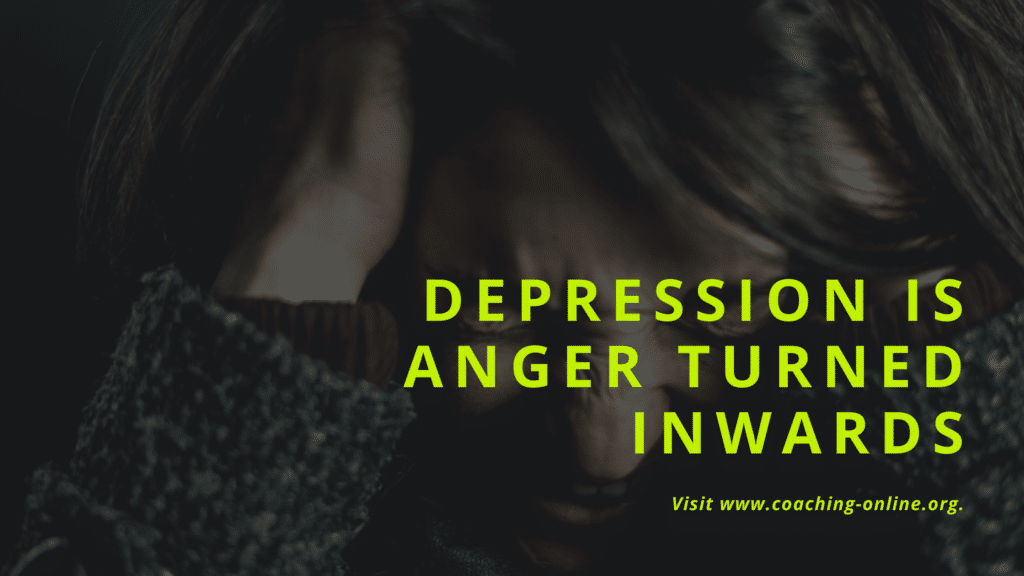Anger isn’t one of the symptoms associated with depression. Unlike sadness or lack of interest, anger is often overlooked.
However, according to Sigmund Freud and other psychological studies, depression is anger turned inwards.
But how do you deal with anger from depression?
This article aims to answer this question. In this article, you’ll learn 13 ways you can heal from depression caused by anger turned inwards.
Here’s what you’ll learn:
Let’s get right into it.
What is Depression?
Depression is a diagnosable mental health disorder that involves a constant feeling of low moods, sadness, and lack of interest.
Depression can also involve feelings of guilt, worthlessness, helplessness, and hopelessness. Depression affects how you view yourself, the world around you, as well as your future.
While it might seem like depression is simply sadness or grief in excess, this isn’t the case at all! Depression is so much more than just being sad.
Depression isn’t even a mood disorder in the strictest sense of the word because it doesn’t involve any misregulation of emotions.
Some other symptoms of depression include:
- Constant feelings of sadness
- Reduced energy levels
- Insomnia or too much sleep
- Appetite changes
- Loss of interest in hobbies and activities you once enjoyed
- Difficulty making decisions
- Suicidal thoughts
To be diagnosed as depressed, one must exhibit these symptoms and meet the criteria specified in the Diagnostic and Statistical Manual of Mental Disorders (DSM-5).
What is Anger
Unlike depression, anger isn’t a mental health disorder. Anger is a natural and normal human emotion.
Anger can be defined as an unpleasant emotional response to a perceived provocation or threat with the goal of eliminating that threat. In other words, anger represents an instinctive reaction aimed at self-protection from real or imagined harm.
Despite anger being an emotion that every human being experiences, it may be more prominent in people going through depression.
According to a 2016 study, anger turned on ourselves results in increased severity of depression symptoms.
However, not all anger turned inward results in depression. One type of anger results in acting against what makes you angry, while another results in rumination, which results in increased severity of depression.
So, what types of anger are these?
Types of Anger
Adaptive Anger
Adaptive anger is anger that pushes you to make positive changes in your life.
An example of adaptive anger is someone who notices they aren’t happy with their earnings; therefore, take actions to start a side hustle to help remedy the situation.
Maladaptive Anger
Maladaptive anger, on the other hand, is anger that leads you on a downward spiral.
This type of anger involves ruminating about your situation, which leads you to feel more helpless and hopeless.
This, in turn, results in negative thoughts and feelings about yourself, which exacerbates your depression symptoms.
But how does anger turned inwards manifest in depression? Keep reading to learn more!
How anger Disguises itself in depression
Irritability
People with depression often have a hard time accepting disappointments. They react negatively to disappointments and tend to snap at other people over trivial things.
If you find yourself being irritable, you may be experiencing depression from anger turned within.
Hostility
People with depression often lash out in anger at others. Depression sufferers tend to feel alienated and alone, so they may express this feeling of isolation by being hostile towards their loved ones or people around them.
If you start showing hostility even when there’s no provocation involved, it could be a sign that your depression is caused by anger turned inwards
Anger Attacks
Depression sufferers may also experience occasional out-of-the-blue anger attacks. Depression can lead to feeling helpless and hopeless, so it’s only natural that you’d feel angry at yourself for not being able to help yourself.

Treatment for Angry Depression
#1. Therapy
Specifically, Emotionally Focused Therapy (EFT).
Developed by Psychologist Les Greenberg, this type of therapy aims at helping you create a sense of compassion for yourself.
By using emotionally focused therapy psychologists can help depression patients manage maladaptive anger.
This is done by converting the anger turned inwards into kindness turned inwards. To do this, therapists often ask patients to talk to themselves as if they were talking to a friend. “What would you say to a friend who was undergoing the same situation?”
Using this simple technique, psychologists can help patients manage their anger and prevent it from turning inward.
In other words, EFT helps you adopt a more positive attitude towards the world around you.
This makes it easier for depression sufferers to let go of negative feelings about themselves that result in being hostile or irritable with
With EFT, a therapist can help patients improve self-esteem and relieve anger-related depression.
#2. Medication
Studies suggest that depression could be caused by a chemical imbalance in the brain. Specifically insufficient levels of serotonin in the brain.
This is why a doctor may prescribe antidepressants to help balance chemicals in the brain. Depression patients who take antidepressants tend to feel better than those who don’t.
Antidepressants work by increasing serotonin levels in the brain, which helps it function more normally.
In other words, antidepressants help treat depression from anger turned inward because they help balance chemicals in the brain that could have been imbalanced.
Depression sufferers who take antidepressants also tend to feel less isolated and alone since their moods improve.
However, don’t get me wrong, medication doesn’t treat anger but helps deal with depressive symptoms that may result in anger.
#3. Brain Stimulation Therapy
EFT isn’t the only therapy that can help treat depression from anger turned inwards.
While still in its experimental stages, brain stimulation therapies have been shown to lead to better results in people resistant to other forms of depression treatment.
Like antidepressants, brain stimulation therapy helps to improve moods in people suffering from depression.
However, unlike antidepressant medication that only affects the brain’s chemical balance, this therapy uses magnets and electrodes placed on a patient’s head to alter electrical activity in specific parts of the brain.
Despite their effectiveness, brain stimulation therapies that use electricity may have side effects, including short-term memory loss.
Another form of brain stimulation therapy that has been shown to help with depression and mood swings is light therapy. This form of treatment uses artificial light to help influence the production of melatonin, which in turn may result in an improved sleep cycle.
#4. Practice Breathing Exercise
While therapy and medication may help alleviate depression from anger turned inwards, you can also take steps to help you deal with anger.
One of these steps is practicing breathing exercises.
When you are feeling angry, take deep breaths in and out for one minute.
This will help center your mind on one thing only – breathing. This simple exercise can lower stress levels that often lead to feelings of anger turned inward, resulting in depression.
A practical example of a breathing exercise is the 4-4-6 breathing technique. In this yoga-inspired breathing technique, you breathe in for a count of four, hold your breath for a count of four, and breath out for a count of four.
Many people who practice this breathing technique claim that it has helped them deal with anger and depression.
This is because deep breaths make you feel calmer, which in turn reduces stress levels. This relaxation can help to reduce feelings of anger or irritability resulting from depressive symptoms such as low moods and lack of sleep.
#5. Mindfulness Meditation or Yoga
Another exercise that may help you deal with anger and depression is mindfulness meditation or yoga.
Both exercises can lead to feelings of calmness, which in turn reduces stress levels. Depression patients who practice either of these activities regularly tend to feel less irritable than those who don’t do them at all.
However, keep in mind that it’s challenging to practice either of these activities when you’re already feeling depressed and stressed out.
Depression brings a host of other problems such as lack of sleep, restlessness, and poor concentration levels. This makes it even harder for depression patients to focus on practicing meditation or yoga.
#6. Alleviate anger Before it Worsens
While it may seem like a good idea to keep your anger and emotions bottled up inside, this is not the best way of dealing with depression from anger turned inwards.
You see, when you suppress feelings such as stress or sadness for too long, these feelings tend to resurface later as anger.
This is why depression patients need to practice healthily expressing their emotions regularly.
Many people try different forms of therapy such as individual therapy, group therapy, and family support sessions before learning how to deal with their emotions better.
If you’re still unsure how to express your anger healthily, try talking about it with someone you trust. You may also want to talk about other topics that don’t trigger your emotions so much before bringing up the issue of anger itself.
Remember: there’s no need for you to keep all these feelings bottled up inside because this will only make things worse.
#7. Develop a Support System
Developing a support system is another way for Depression patients to deal with anger turned inwards.
Depression sufferers tend to lash out, get irritable, and explode at people around them because they are angry but don’t know how else to express it.
This behavior often leads loved ones of the depressed patient to distance themselves from that person. Depression patients need to understand that they are not alone in this battle against depression.
They should seek out friends, family members, and even strangers who can help them feel better about life again. This will help reduce anger towards loved ones because the depression sufferers won’t be as angry at people around them anymore.

#8. Manage Triggers
Depression patients also need to learn how to manage triggers.
One of the biggest reasons depression sufferers get angry at people around them is that they are triggered by something they have said or done.
To help deal with depression from anger turned inwards, you should identify what triggers you to anger. Once you’ve identified these triggers, try to avoid them.
For example, if your loved one always tries to give you advice when you need someone to listen, then tell them that sometimes all it takes for you to feel better is for someone else to listen.
This way, your loved one will understand that you’re not angry at them but instead are just dealing with depression in the best way possible.
Sometimes it’s also helpful to share what triggers your anger so people around you can help avoid it.
#9. Dive Into Spirituality
Another way to deal with depression is by diving into spirituality.
Spirituality can come in many different forms, depending on what religion you practice. Still, there are some universal spiritual practices that depression sufferers should try out if they want to feel better about life again.
For example, meditation has been used for thousands of years as a way of helping people feel more connected to the universe.
Depression sufferers who practice meditation say it helps reduce their stress levels, making them less irritable and angry about life again.
#10. Volunteer
When was the last time you shared kindness with someone?
Studies have shown that depression sufferers who volunteer regularly are less irritable and angry than those who don’t do anything at all in their spare time.
Volunteering can help you feel better about life again because it reminds you that there are many different types of people in this world, and you’re not the only one struggling.

#11. Practice Consistent Gratitude
Did you know that depression patients who practice gratitude regularly are less irritable and angry than those who don’t do anything at all in their spare time?
Gratitude is one of the most potent tools for feeling better about life again because it helps us appreciate what we have instead of focusing on everything wrong with our lives.
Depression sufferers who practice gratitude regularly say it makes them feel less lonely and angry about life because they realize there are many things in their lives for which to be grateful.
This will make Depression patients more compassionate towards themselves and reduce anger turned inwards
#12. Learn a New Skill
Learning a new skill is another way depression patients can feel better about life again.
When people are constantly learning something new, they realize that there’s so much more to learn and experience in this world which helps them see things from a different perspective.
This change in perspective helps depression sufferers understand that there’s a whole world out there for them to explore.
Depression patients who are able to see things from different perspectives say they feel less lonely and angry about life because their sense of wonder is restored, which takes away the “blah” feeling many depression sufferers experience.
#13. Exercise More Regularly
Another way Depression patients can feel better about life is by exercising more regularly.
Exercise helps depression sufferers deal with anger turned inwards because it enhances endorphins which will make you happier and less irritable again
Studies have shown that depression patients who exercise regularly are less irritable and angry than those who don’t do anything at all in their spare time.
If you’re looking for more ways to hide and heal from depression, check out this article here.
Depression is Anger Turned Inwards FAQs
Why Does my Sadness Turn into Anger?
Anger is a secondary emotion that arises after you experience certain primary emotions. These include sadness, disappointment, grief, fear, or anxiety.
Suppressing these primary emotions, including sadness, often leads to you directing anger at yourself.
Which Theory Holds that Depression is Caused by Repressed Anger Turned Inward as Self-Blame?
The psychoanalytic theory.
First coined by Sigmund Freud, the psychoanalytic theory tries to explain the different dynamics of personality development.
In the theory, Freud suggests that depression is anger turned inwards.
Is Depression Really Anger Turned Inward?
While this may seem like an overly simplified explanation of depression, anger does play a huge role in influencing the onset of depression and the severity of depression symptoms.
Studies have shown that Depression patients who are more irritable and angrier about life experience more severe symptoms of depression than those people who don’t feel anger turned inwards.
Any Further Questions?
There you go.
Thirteen insights on how to heal depression caused by anger turned inward.
Which of these tips will you include in your life? How do you deal with anger turned inwards?
Please tell us in the comment section below.
And if you have any questions on how depression is anger turned inwards, please ask them in the comment section.
I’ll be happy to answer any question asked.
Related Content
Ways Hiding Depression Effectively And Heal
